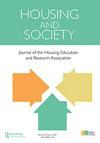Does fido have a foot in the door? Social housing companion animal policies and policy decision-making in a Canadian city
Q2 Social Sciences
引用次数: 7
Abstract
ABSTRACT Living with a companion animal (CA or “pet”) often has a positive impact on quality of life and well-being. Research also highlights potential benefits of CA relationships for populations accessing social housing, which commonly includes individuals with a low income, disabilities, those at risk of homelessness, and seniors. However, it appears that CA policies in social housing organizations can present a barrier to accessing housing that allows tenants to live with CAs. There is a significant shortfall in the literature specific to CA policies in social housing. Our aim is to describe CA policies in one jurisdiction, Edmonton, Canada, and to examine decision-making processes and the sources of information used to inform those decisions within social housing organizations. We found that half of the social housing organizations do not allow cats or dogs. The organizations in our study appear to prioritize four factors when making decisions about CA policies: 1) the organization’s mission and vision; 2) the population served; 3) financial or resource constraints; and 4) the experiences and beliefs of individuals within the organization. Priority research questions are identified to address the need for evidence-informed decision making in the complex area of social housing and quality of life.菲多有脚踩在门上吗?加拿大城市的社会住房伴侣动物政策和政策决策
摘要与伴侣动物(CA或“宠物”)一起生活通常会对生活质量和幸福感产生积极影响。研究还强调了CA关系对获得社会住房的人群的潜在好处,这些人群通常包括低收入、残疾人、有无家可归风险的人和老年人。然而,社会住房组织中的CA政策似乎会成为获得住房的障碍,使租户能够与CA一起居住。关于社会住房中CA政策的具体文献严重不足。我们的目的是描述加拿大埃德蒙顿一个司法管辖区的CA政策,并审查决策过程和社会住房组织内用于告知这些决策的信息来源。我们发现,一半的社会住房组织不允许养猫或狗。在我们的研究中,组织在做出CA政策决策时似乎优先考虑了四个因素:1)组织的使命和愿景;2) 服务人口;3) 财政或资源限制;以及4)组织内个人的经历和信念。确定了优先研究问题,以解决在社会住房和生活质量这一复杂领域进行循证决策的必要性。
本文章由计算机程序翻译,如有差异,请以英文原文为准。
求助全文
约1分钟内获得全文
求助全文
来源期刊

Housing and Society
Social Sciences-Urban Studies
CiteScore
2.30
自引率
0.00%
发文量
10
期刊介绍:
Housing and Society is the journal of the Housing Education and Research Association (HERA). The journal supports the mission of HERA by providing for the dissemination of research and other scholarly work. Submissions from a broad range of perspectives are encouraged. Topics in housing include: policy, design, social aspects, gerontology, behavioral aspects, energy/environment, equipment, interiors, economics, theory/model development, education, and program development or evaluation. The journal welcomes the submission of original research articles, notes and commentaries. Notes are shorter manuscripts presenting succinct information on housing related to one of the following categories: - Research: exploratory or not heavily theory-based or statistically analyzed - Academic: innovative teaching ideas - Program: development, implementation, and/or evaluation of Cooperative Extension or other housing programming efforts - Policy: examination of policy impact, comparative analysis, and/or need to achieve housing goals - Reviews: books, documentaries, etc.
 求助内容:
求助内容: 应助结果提醒方式:
应助结果提醒方式:


